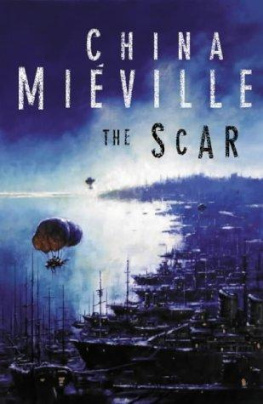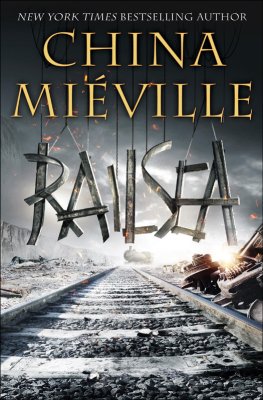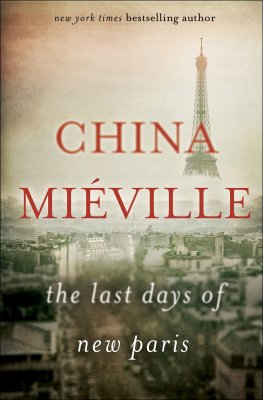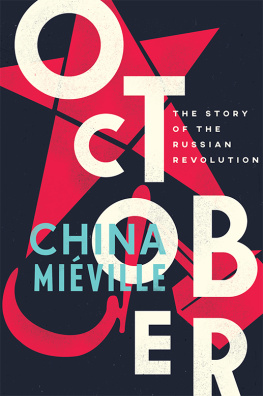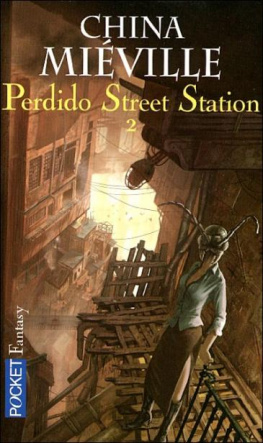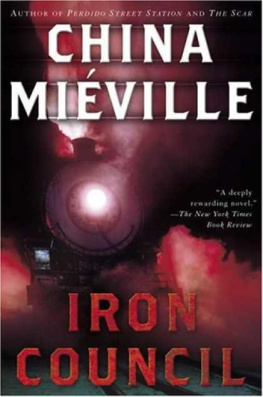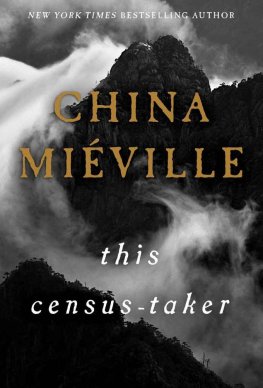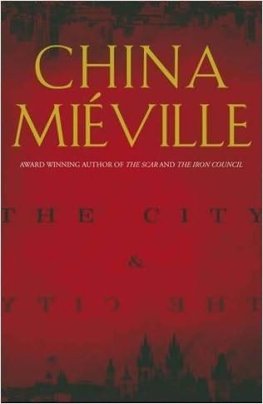China Mieville - The Scar
Here you can read online China Mieville - The Scar full text of the book (entire story) in english for free. Download pdf and epub, get meaning, cover and reviews about this ebook. genre: Art. Description of the work, (preface) as well as reviews are available. Best literature library LitArk.com created for fans of good reading and offers a wide selection of genres:
Romance novel
Science fiction
Adventure
Detective
Science
History
Home and family
Prose
Art
Politics
Computer
Non-fiction
Religion
Business
Children
Humor
Choose a favorite category and find really read worthwhile books. Enjoy immersion in the world of imagination, feel the emotions of the characters or learn something new for yourself, make an fascinating discovery.
- Book:The Scar
- Author:
- Genre:
- Rating:4 / 5
- Favourites:Add to favourites
- Your mark:
- 80
- 1
- 2
- 3
- 4
- 5
The Scar: summary, description and annotation
We offer to read an annotation, description, summary or preface (depends on what the author of the book "The Scar" wrote himself). If you haven't found the necessary information about the book — write in the comments, we will try to find it.
The Scar — read online for free the complete book (whole text) full work
Below is the text of the book, divided by pages. System saving the place of the last page read, allows you to conveniently read the book "The Scar" online for free, without having to search again every time where you left off. Put a bookmark, and you can go to the page where you finished reading at any time.
Font size:
Interval:
Bookmark:
The Scar
China Miville
To Claudia, my mother
Yet the memorywould not set into the setting sun, that green and frozen glance tothe wide blue sea where broken hearts are wrecked out of theirwounds. A blind sky bleached white the intellect of human bone,skinning the emotions from the fracture to reveal the griefunderneath. And the mirror reveals me, a naked and vulnerable fact.
Dambudzo Marechera, Black Sunlight
A mile below thelowest cloud, rock breaches water and the sea begins.
It has been givenmany names. Each inlet and bay and stream has been classified as ifit were discrete. But it is one thing, where borders are absurd. Itfills the spaces between stones and sand, curling around coastlinesand filling trenches between the continents.
At the edges of theworld the salt water is cold enough to burn. Huge slabs of frozen seamimic the land, and break and crash and reform, crisscrossed withtunnels, the homes of frost-crabs, philosophers with shells of livingice. In the southern shallows there are forests of pipe-worms andkelp and predatory corals. Sunfish move with idiot grace. Trilobitesmake nests in bones and dissolving iron.
The sea throngs.
There arefree-floating top-dwellers that live and die in surf without everseeing dirt beneath them. Complex ecosystems flourish in neriticpools and flatlands, sliding on organic scree to the edge of rockshelves and dropping into a zone below light.
There are ravines.Presences something between molluscs and deities squat patientlybelow eight miles of water. In the lightless cold a brutality ofevolution obtains. Rude creatures emit slime and phosphorescence andmove with flickerings of unclear limbs. The logic of their formsderives from nightmares.
There are bottomlessshafts of water. There are places where the granite and muck base ofthe sea falls away in vertical tunnels that plumb miles, spillinginto other planes, under pressure so great that the water flowssluggish and thick. It spurts through the pores of reality, seepingback in dangerous washes, leaving fissures through which displacedforces can emerge.
In the chill middledeeps, hydrothermic vents break through the rocks and spew clouds ofsuperheated water. Intricate creatures bask in this ambient warmththeir whole short lives, never straying beyond a few feet of warm,mineral-rich water into a cold which would kill them.
The landscape belowthe surface is one of mountains and canyons and forests, shiftingdunes, ice caverns and graveyards. The water is dense with matter.Islands float impossibly in the deeps, caught on charmed tides. Someare the size of coffins, little slivers of flint and granite thatrefuse to sink. Others are gnarled rocks half a mile long, suspendedthousands of feet down, moving on slow, arcane streams. There arecommunities on these unsinking lands: there are hidden kingdoms.
There is heroism andbrute warfare on the ocean floor, unnoticed by land-dwellers. Thereare gods and catastrophes.
Intruding vesselspass between the sea and the air. Their shadows fleck the bottomwhere it is high enough for light to reach. The trading ships andcogs, the whaling boats pass over the rot of other craft. Sailorsbodies fertilize the water. Scavenger fish feed on eyes and lips.There are jags in the coral architecture where masts and anchors havebeen reclaimed. Lost ships are mourned or forgotten, and the livingfloor of the sea takes them and hides them with barnacles, gives themas caves to morays and ratfish and cray outcastes; and other moresavage things.
In the deepestplaces, where physical norms collapse under the crushing water,bodies still fall softly through the dark, days after their vesselshave capsized.
They decay on theirlong journey down. Nothing will hit the black sand at the bottom ofthe world but algae-covered bones.
At the edges of theshelves of rock where cold, light water gives way to a creepingdarkness, a he-cray scrambles. He sees prey, clicks and rattles deepin his throat while he slips the hood from his hunting squid andreleases it.
It bolts from him,diving for the shoal of fat mackerel that boil and re-form like acloud twenty feet above. Its foot-long tentacles open and whip closedagain. The squid returns to its master, dragging a dying fish, andthe school reknits behind it.
The cray slices thehead and tail from the mackerel and slips the carcass into a net bagat his belt. The bloody head he gives his squid to gnaw.
The upper body ofthe cray, the soft, unarmored section, is sensitive to minute shiftsof tide and temperature. He feels a prickling against his sallow skinas complex washes of water meet and interact. With an abrupt spasmthe mackerel-cloud congeals and disappears over the crusted reef.
The cray raises hisarm and calls his squid closer to him, soothes it gently. He fingershis harpoon.
He is standing on agranite ridge, where seaweed and ferns move against him, caressinghis long underbelly. To his right, swells of porous stone rise abovehim. To the left the slope falls away fast into disphotic water. Hecan feel the chill emanating from below. He looks out into a steepgradation of blue. Way overhead, on the surface, there are ripples oflight. Below him the rays peter swiftly out. He stands only a littleway above the border of perpetual dark.
He treads carefullyhere, on the edge of the plateau. He often comes to hunt here, whereprey are less careful, away from the lighter, warmer shallows.Sometimes big game rises curiously from the pitch, unused to hisshrewd tactics and barbed spears. The cray shifts nervously in thecurrent and stares out into the open sea. Sometimes it is not preybut predators that rise from the twilight zone.
Eddies of cold rollover him. Pebbles are dislodged around his feet and bounce slowlydown the slope and out of sight. The cray braces himself on theslippery boulders.
Somewhere below himthere is a soft percussion of rocks. A chill not carried by anycurrent creeps across his skin. Stones are realigning, and a spill ofthaumaturgic wash is spewing through new crevices.
Something baleful isemerging in the cold water, at the edge of the dark.
The cray hunterssquid is beginning to panic, and when he releases it again, it jetsinstantly up the slope, toward the light. He peers back into themurk, looking for the source of the sound.
There is an ominousvibration. As he tries to see through water stained by dust andplankton, something moves. Way below, a plug of rock bigger than aman shudders. The cray bites his lip as the great irregular stonefalls suddenly free and begins a grinding descent.
The thundering ofits passage reverberates long after it has become invisible.
There is a pit inthe slope now, that stains the sea with darkness. It is quiet andmotionless for a time, and the cray fingers his spear with anxiety,clutching at it and hefting it and feeling himself tremble.
And then, softly,something colorless and cold slips from the hole.
It confuses the eye,flitting with a grotesque organic swiftness that seems to belieintention, like gore falling from a wound. The he-cray is quitestill. His fear is intense.
Another shapeemerges. Again he cannot make it out: it evades him; it is like amemory or an impression; it will not be specified. It is fast andcorporeal and coldly terrifying.
There is another,and then more, until a constant quick stream dribbles from thedarkness. The presences shift, not quite invisible, communing anddissipating, their movements opaque.
The he-cray isstill. He can hear strange, whispering discourses on the tides.
Next pageFont size:
Interval:
Bookmark:
Similar books «The Scar»
Look at similar books to The Scar. We have selected literature similar in name and meaning in the hope of providing readers with more options to find new, interesting, not yet read works.
Discussion, reviews of the book The Scar and just readers' own opinions. Leave your comments, write what you think about the work, its meaning or the main characters. Specify what exactly you liked and what you didn't like, and why you think so.

